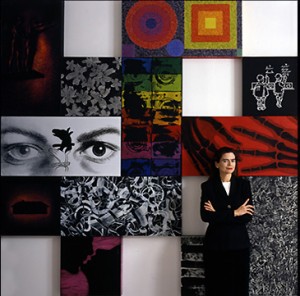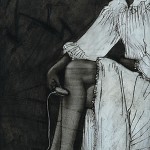Interview with Artist Chris Anderson
By Jose-Manuel Saavedra
Preliminary statement by Chris Anderson:“I believe that art should be authentic. By that I mean that it should come from the stuff of your life—your passions, your world view, what’s of value and of importance to you. Work that is authentic has the potential to be great.”
Please tell me about your educational background. Where did you go to school? What did you study?
I studied visual art in Italy, at the Tyler School of Art in Rome, in New York at the Pratt Institute of Art, and in California, at Scripps College (BA, 1971) and the Claremont Graduate University (MFA, 1973).
What did you get out of school that continues to help you today?
I learned to think independently. My college was based on a four-year program of the humanities. I have found this to be the gift that keeps on giving. At that time the world of contemporary art opened up to me.
If you could be a student again, what would you do differently?
Study more and play less, take more languages (more French, less Greek). I would have read more 19th century philosophy. I did take time to smell the flowers.
What do you in your job? What is an average day like for you?
It varies. When I am teaching, I focus only on teaching. I plan my lessons, teach hard and stay in the college studio with my students until every last question is answered. Often I’m at school until midnight.
An average day in my own studio involves working not only on paintings, but also on the business of art—photographing, color correcting and editing images, answering emails, working on my website, working with my interns. I usually work eight or more hours a day, six days a week.
What do you enjoy most about your work?
Creating something out of nothing. That’s what thrills me the most about painting.
What do you find most challenging?
Everything but creating the work itself. By ‘everything’ I refer to the business of art, as I mentioned before: paper work, taxes, bills, marketing, and the other mundane activities of running a business. I suppose that’s one factor that goes with the territory of being a professional. Many of the activities of being an artist are ordinary, not glamorous.
What skills are most essential in your job?
How best to push substances around a two-dimensional surface with a cluster of hairs tied to a long stick.
(Comment of the interviewer: It is all about finding a unique way to answer that question).
How did you get to where you are today?
By hard work, perseverance, and the grace of God.
What advice would you give to the young artist who is interested in pursuing the career you’re in? How could they get started?
First, get your MFA. I know you will work hard and persevere.
Would it be okay for my professor or the students to follow up with you later on if they have any questions? If so, what is the best way for them to get in touch with you?
They may get in touch with me by email: chrisandersonart@gmail.com or website: http://chrisandersonart.com.





